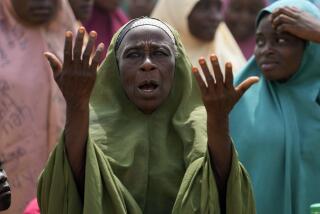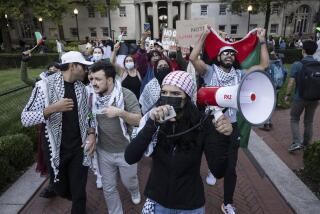A Pakistani School Teaches Faith and War
- Share via
PESHAWAR, Pakistan — At the Markaz Uloom Islamia religious school, the war against the West is given a sacred blessing.
Set amid the frontier hustle along Pakistan’s border with Afghanistan, the Markaz school preaches equal parts war and Islam, infusing its students with a righteous rage that carries them to places far beyond it.
“We will fight the enemies of Islam,” said Ziaur Rehman, a 30-year-old student who says he plans to join the battle in Afghanistan--or anywhere else he’s needed--as soon as he completes his studies.
“I wait for the call of my leaders,” he said.
It is at schools like Markaz where many moujahedeen, or holy warriors, forge their identities and find their justification before setting off to military camps such as the one struck last week in Afghanistan by U.S. cruise missiles.
The Markaz school is one of an estimated 6,000 such institutions, called madrasas, that are clustered in the rolling wasteland of northern Pakistan.
Although religious schools are common throughout the Muslim world, and most are geared toward teaching a thorough understanding of Islam and the Koran, the schools of northern Pakistan have become centers of fundamentalist zeal.
Thousands of the soldier-students who flocked to Afghanistan when the Taliban began its takeover of that country in 1994--as much as 40% of the fundamentalist movement’s army, according to Western diplomats here--came from the madrasas of Pakistan. And the schools continue to be the wellspring for the wars of Islam around the globe.
The students, mostly ethnic Pushtuns from both sides of the border, take little notice of the line that separates Pakistan and Afghanistan. Some observers in Pakistan worry that the more radical graduates of the madrasas, cheered by recent victories of the Taliban in northern Afghanistan, will become too strong to contain.
“These are very committed people,” said Shireen Mazari, the editor of Pulse, a weekly newspaper in Islamabad, the Pakistani capital. “The people in these schools have never succeeded electorally, and the fear is that they will use violence to implement their agenda.”
Within the peaceful confines of the Markaz school, there is little, at first, that suggests that many of the students consider themselves modern-day defenders of the faith. Syadul Arifeen, the school principal, says his students spend most of their days memorizing passages from the Koran, Islam’s holy book. The whitewashed halls echo with a hundred chanting voices.
In one room, the class’ robed and bearded professor, Shahfiullah, is sitting cross-legged on the floor and reading a passage from the Koran about an animal that was not slaughtered in the proper Muslim way. “The holy prophet said this camel could not be eaten,” Shahfiullah said.
*
About 150 students, some only 5 years old, study in the Markaz’s complex of mosque and classrooms. Most wander the open-air halls wearing the long gowns and the white caps signifying that they have performed the hajj pilgrimage to Mecca, Islam’s holiest shrine. Many plan to stay for as long as eight years to complete their education before moving on.
“Some will go and fight,” said Arifeen, the principal. “I am not proud when Muslims fight with one another. But I am proud if they fight for noble causes, I am proud if they fight against evil, I am proud if they fight injustice, and I am proud if they fight for the glory of Islam.”
Many of the students and faculty believe that Islam, with an estimated 1.1 billion adherents worldwide, is a beleaguered faith. Zianullah, a student attending the Koran class, says he intends to become a warrior when he leaves the Markaz school so that he can help save his religion.
“Islam and Muslims have so many enemies,” he said. “I will not name a particular country, but you know them.”
No former students from the Markaz school were in the camp that was attacked by U.S. cruise missiles Aug. 20, according to Arifeen. His statement could not be verified.
Rahimullah, a turbaned Afghan student who, like many people in the region, goes by one name, says he fought with the Taliban forces in 1995 and 1996, when they swept into the Afghan capital, Kabul, and imposed an ultraconservative form of Islam that limits women’s access to work and schools and forbids such activities as listening to music and flying kites.
“I was very happy and proud that we had defeated the slaves of the Russians,” Rahimullah said during a break from class, referring to the Taliban’s overthrow of the Afghan government. “All the Afghans were happy.”
Rahimullah says he returned to the Markaz school to complete his religious studies. While here in Peshawar, he says, he is running a network for the Taliban to gather intelligence on its enemies.
Rahimullah figures that he will finish his studies at the Markaz and then return to Afghanistan to fight. He says he will do anything to help promote his faith.
“Islam does not accept any borders,” he said. “We will be happy to offer help if there is an Islamic movement that needs our help.”
The talk of the Markaz school these days is the U.S. cruise missiles, some of which exploded just 60 miles away. The students here roundly condemn the attacks, and most claim not to know Osama bin Laden, the exiled Saudi millionaire whose organization American officials say ran the terrorist training camp that the U.S. targeted last week. But the students also rush to Bin Laden’s defense.
Most say they disapprove of the killing of civilians, as occurred in the Aug. 7 bombings of the U.S. embassies in Kenya and Tanzania, but add that no evidence has linked Bin Laden to such attacks.
“Osama is a supporter of the oppressed people around the world,” said Mohyuddin, a 27-year-old student. “At the time of the Russian occupation, no one said he was a terrorist.”
More to Read
Sign up for Essential California
The most important California stories and recommendations in your inbox every morning.
You may occasionally receive promotional content from the Los Angeles Times.










